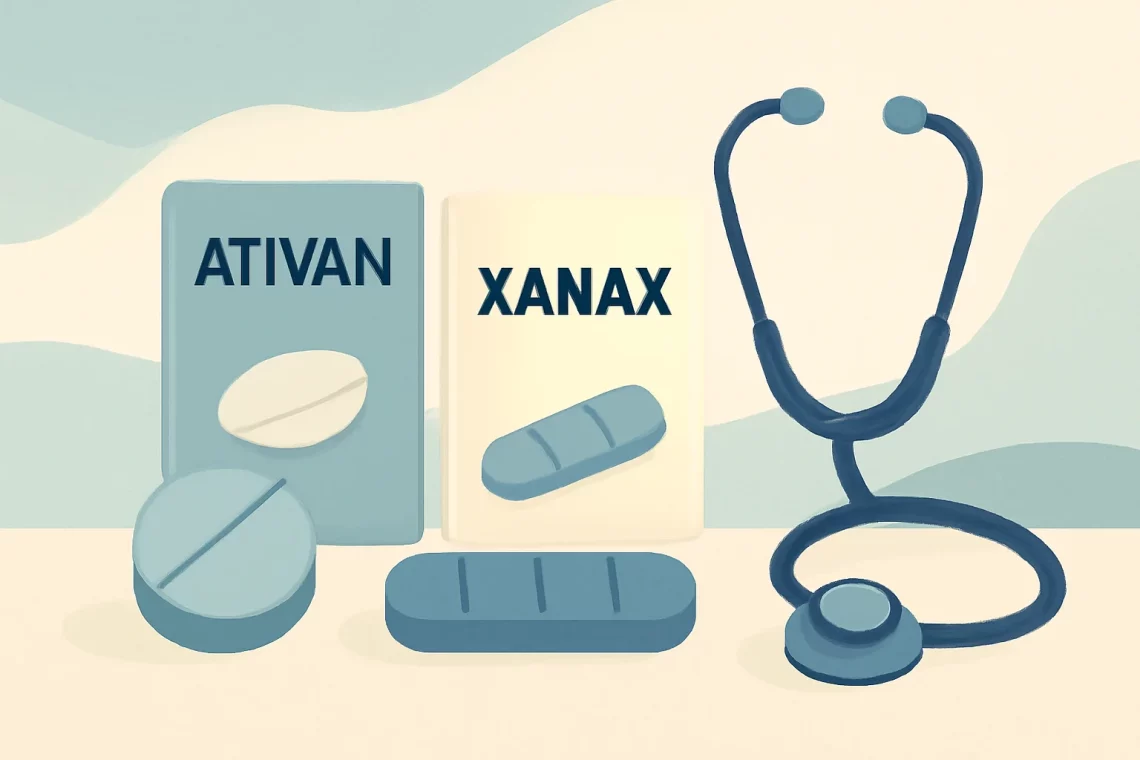-
Ativan vs Restoril: Comparing Two Popular Sleep Medications
Ativan and Restoril are two medications commonly prescribed to treat anxiety and sleep disorders. Both belong to the class of benzodiazepines, which are known for their sedative and anxiolytic effects. While they share some similarities in their mechanism of action and therapeutic uses, they also have distinct differences that can influence a physician’s choice when prescribing them. Understanding these differences is essential for patients who may be considering treatment options for anxiety or insomnia. The use of benzodiazepines has become a topic of discussion in recent years, as healthcare providers and patients weigh the benefits against the potential risks associated with long-term use. Issues such as dependency, tolerance, and withdrawal…
-
Clonazepam vs Ativan: Understanding Their Differences and Uses
Clonazepam and Ativan are two medications that fall under the category of benzodiazepines, which are widely prescribed for their sedative, anti-anxiety, and muscle-relaxing properties. These medications have gained prominence for their effectiveness in treating various mental health conditions, including anxiety disorders, panic attacks, and seizures. The rise in the prescription of benzodiazepines has led to a growing interest in understanding the differences and similarities between Clonazepam and Ativan, especially among those seeking relief from anxiety and related disorders. As the demand for effective treatment options increases, patients and healthcare providers alike are keen to compare these two medications. While both Clonazepam and Ativan can provide significant benefits, they also come…
-
Ativan vs Seroquel: Comparing Uses, Benefits, and Side Effects
Ativan and Seroquel are two medications frequently prescribed for mental health conditions, each with distinct mechanisms of action and indications. Understanding the nuances of these drugs can be crucial for patients and healthcare providers alike. While both medications are utilized in the treatment of anxiety and mood disorders, they belong to different classes and have varying side effects, benefits, and risks. Ativan, generically known as lorazepam, is a benzodiazepine that primarily acts as an anxiolytic, providing rapid relief from anxiety symptoms. Seroquel, or quetiapine, is an atypical antipsychotic primarily used to manage conditions like schizophrenia and bipolar disorder. The differences in their pharmacological profiles can greatly influence treatment outcomes and…
-
Ativan vs Xanax: Understanding the Differences and Uses
Ativan and Xanax are two commonly prescribed medications that belong to a class of drugs known as benzodiazepines. These medications are primarily used for the treatment of anxiety disorders, panic attacks, and other related conditions. While both Ativan and Xanax share similar therapeutic effects, there are notable differences between the two that can influence a healthcare provider’s choice in prescribing one over the other. Understanding these differences, including their pharmacological properties, potential side effects, and the contexts in which they are most effective, is crucial for patients seeking relief from anxiety and related symptoms. As anxiety disorders become increasingly prevalent, the conversations surrounding the use of such medications have garnered…
-
Ativan vs Valium: Understanding Their Differences and Uses
Ativan and Valium are two widely recognized medications that belong to the benzodiazepine class of drugs. Both are primarily used to treat anxiety and other related conditions, but they have different properties, indications, and effects on the body. As the prevalence of anxiety disorders continues to rise, understanding the distinctions between these two medications becomes increasingly important. Benzodiazepines work by enhancing the effects of a natural chemical in the body called gamma-aminobutyric acid (GABA). This action leads to a calming effect on the central nervous system, which can be beneficial for those experiencing anxiety, panic attacks, or sleep disorders. However, while both Ativan (lorazepam) and Valium (diazepam) serve similar purposes,…
-
Ativan vs Vistaril: A Comprehensive Comparison of Anxiety Medications
Ativan and Vistaril are two medications often used to manage anxiety and related conditions, but they belong to different drug classes and have distinct mechanisms of action. Understanding these differences is crucial for patients and healthcare providers when determining the most appropriate treatment option. Both medications have their unique benefits and potential side effects, which can influence the choice between them. Ativan, a brand name for lorazepam, is a benzodiazepine known for its sedative properties. It is commonly prescribed for anxiety disorders, insomnia, and even certain seizure disorders. Vistaril, or hydroxyzine, is an antihistamine with anxiolytic properties, often used for anxiety relief and as a sedative prior to surgery. By…
-
Xanax vs Ativan: Understanding the Differences and Uses
Xanax and Ativan are both medications commonly prescribed to manage anxiety and other related disorders. They belong to a class of drugs known as benzodiazepines, which are often utilized for their sedative and calming effects. While they may serve similar purposes, these medications differ in their chemical composition, usage, and side effects. Understanding the distinctions between Xanax and Ativan is crucial for patients and healthcare providers alike, as it can impact treatment decisions and overall patient outcomes. As anxiety disorders continue to affect a significant portion of the population, the choice between these two medications can be a pivotal one. In this article, we will explore the fundamental differences and…
-
Ativan vs Librium: Understanding Their Differences and Uses
Ativan and Librium are two medications that belong to the benzodiazepine class, commonly prescribed for anxiety-related disorders. While both drugs are effective in treating anxiety, they have different profiles in terms of their chemical structure, duration of action, and specific uses. Understanding the nuances between Ativan (lorazepam) and Librium (chlordiazepoxide) can help patients and healthcare providers make informed decisions about treatment options. This discussion is particularly relevant as anxiety disorders have become increasingly prevalent in today’s fast-paced society. As individuals seek relief from their symptoms, it is essential to understand how these medications work, their potential side effects, and the circumstances under which they are prescribed. Choosing the right medication…
-
Ativan vs Buspar: Comparing Anxiety Medications and Their Effects
Ativan and Buspar are two medications commonly prescribed for anxiety and related disorders. While they are both used to alleviate symptoms of anxiety, they belong to different classes of drugs and have distinct mechanisms of action, side effects, and usage considerations. Understanding the differences between these two medications can help patients make informed decisions about their treatment options. Ativan, known generically as lorazepam, is a benzodiazepine that works by enhancing the effects of a neurotransmitter called gamma-aminobutyric acid (GABA) in the brain. This results in a calming effect, which can help reduce feelings of anxiety and promote relaxation. On the other hand, Buspar, or buspirone, is an anxiolytic that does…
-
How Does Ativan Make You Feel? Understanding Its Effects and Benefits
Ativan, known generically as lorazepam, is a medication belonging to the benzodiazepine class, often prescribed for anxiety, insomnia, and various other conditions. Its sedative properties make it effective for calming the nervous system and alleviating feelings of tension. Many individuals turn to Ativan for its quick-acting relief, but understanding how it affects the body and mind is crucial for anyone considering its use. The sensation of taking Ativan can vary significantly from person to person, influenced by factors such as dosage, individual sensitivity to medications, and concurrent health issues. While some users report a sense of tranquility and relaxation, others may experience side effects or an emotional dulling that could…






































